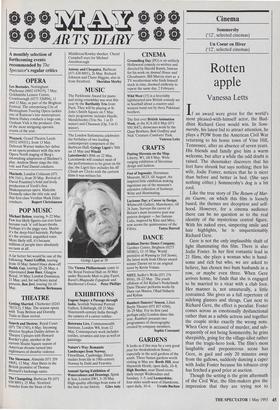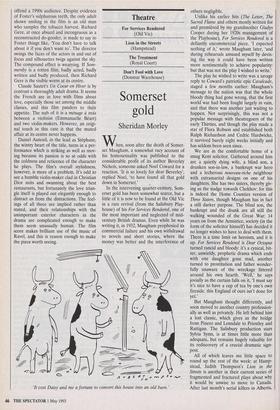Cinema
Sommersby (`12', selected cinemas) Un Coeur en Hiver (`12', selected cinemas)
Rotten apple
Vanessa Letts
If an award were given for the world's most pleased-with-himself actor, the Bud- dhist Richard Gere would win. In Som- mersby, his latest bid to attract attention, he plays a POW from the American Civil War returning to his home town of Vine Hill, Tennessee, after an absence of seven years. His friends and family give him a warm welcome, but after a while the odd doubt is raised. The shoemaker discovers that his feet have shrunk but says nothing; then his wife, Jodie Foster, notices that he is nicer than before and better in bed. (She says nothing either.) Sommersby's dog is a bit cool.
Like the true story of The Return of Mar- tin Guerre, on which this film is loosely based, the themes are deception and self- hood. However, for a cinema audience there can be no question as to the real identity of the mysterious central figure. With his naked eyes, simpering smile and hair highlights, he is unquestionably Richard Gere.
Gere is not the only implausible shaft of light illuminating this film. There is also Jodie Foster. In her first romantic lead in 21 films, she plays a woman who is hand- some and rich but who, we are asked to believe, has chosen two bum husbands in a row, or maybe even three. When Gere arrives home, he finds that she is engaged to be married to a vicar with a club foot. Her manner is, not unnaturally, a little restrained. She gives us a full repertoire of sidelong glances and shrugs. Cast next to Richard Gere, the effect is peculiar. Foster comes across as emotionally dysfunctional rather than as a subtle actress and together the couple strike exactly the wrong note. When Gere is accused of murder, and sub- sequently of not being Sommersby, he grins sheepishly, going for the village-idiot rather than the tragic-hero look. The film's most laughable and preposterous scene has Gere, in gaol and only 20 minutes away from the gallows, suddenly dancing a caper with Jodie Foster because his tobacco crop has fetched a good price at auction.
Though the setting is the grim aftermath of the Civil War, the film-makers give the impression that they are trying not to
offend a 1990s audience. Despite evidence of Foster's sulphurous teeth, the only adult shown smiling in the film is an old man who samples the tobacco harvest. Richard Gere, at once absurd and incongruous as a reconstructed do-gooder, is made to say to Foster things like, 'You don't have to talk about it if you don't want to'. The director swings the faces of the actors in and out of focus and silhouettes twigs against the sky. The compound effect is wearying. If Som- mersby is a rotten film, badly acted, badly written and badly produced, then Richard Gere is the visible worm at its centre.
Claude Sautet's Un Coeur en Hiver is by contrast a thoroughly adult drama. It seems the French are in love with films about love, especially those set among the middle classes, and this film panders to their appetite. The nub of it is a ménage a trois between a violinist (Emmanuelle Be'art) and two violin-makers. However, an origi- nal touch in this case is that the muted affair at its centre never happens.
Daniel Auteuil, in the lead as Stephane, the wintry heart of the title, turns in a per- formance which is striking as well as mov- ing because its passion is so at odds with the coldness and reticence of the character he plays. The film's overall stylishness, however, is more of a problem. It's odd to see a humble violin-maker clad in Christian Dior suits and swanning about the best restaurants, but fortunately the love trian- gle itself is played out elegantly enough to distract us from the distractions. The feel- ings of all three are implied rather than stated, and their relationships with the unimportant exterior characters in the drama are complicated enough to make them seem unusually human. The film score makes brilliant use of the music of Ravel, and this is reason enough to make the piece worth seeing.



























































 Previous page
Previous page